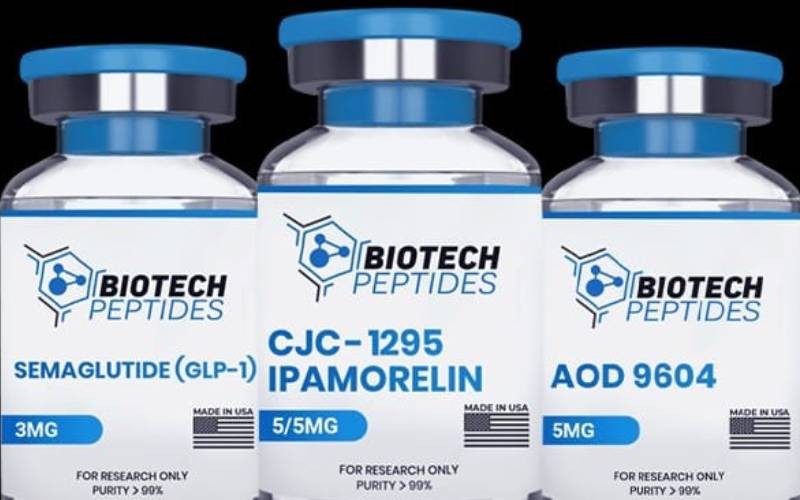
This comprehensive guide will explore many peptides and peptide combinations that may have the potential to promote hair follicle growth, among other theorised properties such as:
- Possibly boosting the density and length of the follicle.
- Possibly lessening the thinning of the follicle and overall loss.
GHK-Cu Peptide
Studies suggest the copper tripeptide GHK-Cu is present in several fluids and may aid tissue repair, particularly in skin cells. It has been hypothesised to renew the extracellular components and restore collagen by regulating the synthesis and breakdown of collagen and other proteins. Also, research suggests that GHK-Cu may help with hair loss by halting hair follicle shrinking by regulating overexpressed transforming growth factor-beta 1 (TGFB1).
Collagen Peptides
Investigations purport that collagen peptides, tiny peptide fragments, may provide the organism with the amino acids to produce extracellular matrix components. Improved skin hydration and elasticity have been linked to their exposure. In addition, research suggests that the presentation of collagen peptides produced from fish may promote the production of hair regeneration factors and dermal papilla cells, which may increase hair growth like certain substances.
Foltin
Research suggests that Foltin is a potential formula for stimulating hair growth that may combine topical peptides with unknown components. The mixture has been theorised to contain:
- A growth factor peptide.
- A copper peptide (which may inhibit TGFB1 and decrease cell apoptosis in the dermal papilla).
- A B-vitamin conjugated peptide.
- An antioxidant and anti-inflammatory peptide.
Investigations purport these components may increase collagen production, decrease inflammation, and strengthen antioxidant defences against factors that cause hair loss.

Research Peptides: What are they?
Peptides are chemical compounds and may be produced in labs for research. From a structural perspective, peptides are proteins because they are chains of amino acids connected by peptide bonds. While the majority of peptides are linear in form, a small number are cyclical or even branching.
With a few significant exceptions, most peptides consist of a single polypeptide chain. Insulin was the first peptide to be studied clinically; however, the molecule is translated as a single chain, and a curved area termed the C peptide is sliced off. Insulin has two chains. Proteins with amino acid sequences of two dozen to fifty or somewhat more are often referred to as peptides (insulin has fifty-one amino acids, for example). Every peptide's characteristics are defined by its sequence of amino acids. Findings imply that although peptides are not as long as proteins, they may play an essential role in several vital physiological processes, such as:
- The relay of hormones
- Molecular control
- Nervous system communication
- Healing of tissues
Several peptides have suggested promise in regulating cellular proliferation and apoptosis, keratin production, vascularization, growth factor expression, and other processes, making follicle growth one of these areas of study.
Peptides and hair follicles
Findings imply peptides that may promote hair growth might influence the development and proliferation of cells inside the hair follicles. Dermal papilla cells and keratinocytes, often known as matrix cells, are examples of these types of cells.
According to some research, the naturally occurring peptide Thymosin beta-4 seems to enhance hair development by encouraging stem cells and hair-clonogenic keratinocytes (cells that resemble stem cells) to migrate to the base of hair follicles.
Scientists speculate that increasing vascularization is one possible mechanism by which Thymosin beta-4 may enhance blood and nutrient delivery to hair follicles. Vascular endothelial growth factor (VEGF) and other vascularization-related growth factors are upregulated to accomplish this.
So far, most research on hair-growing peptides has occurred in either in vitro or animal studies. Preclinical research has suggested that peptides may promote hair development, and the most important findings from these studies are summarised below:
It has been proposed that collagen peptides obtained from fish and mice may enhance hair growth. The peptides appeared to reduce the growth inhibitory factor TGFB1 and seemed to raise the expression of hair growth factors such as IGF-1, VEFG, krt27, Gprc5d, and Ki67. In addition, they have been hypothesised to enhance hair regrowth and dermal papilla cell proliferation in vitro.
Research on animals has indicated that hair may grow faster when the genes for the naturally occurring peptide Thymosin beta-4 are overexpressed. Faster regeneration and more hair shafts were also reported in these studies. It has been speculated that identical effects may be seen when the peptide or its active sequence LKKTETQ is present. Scientists have hypothesised that GHK-Cu might promote hair development and thicken the hair shaft.
Click here to be redirected to the Biotech Peptides website, where you can find more educational articles and the highest-quality research compounds for your studies.
 The Standard Group Plc is a multi-media organization with investments in media
platforms spanning newspaper print operations, television, radio broadcasting,
digital and online services. The Standard Group is recognized as a leading
multi-media house in Kenya with a key influence in matters of national and
international interest.
The Standard Group Plc is a multi-media organization with investments in media
platforms spanning newspaper print operations, television, radio broadcasting,
digital and online services. The Standard Group is recognized as a leading
multi-media house in Kenya with a key influence in matters of national and
international interest.
 The Standard Group Plc is a multi-media organization with investments in media
platforms spanning newspaper print operations, television, radio broadcasting,
digital and online services. The Standard Group is recognized as a leading
multi-media house in Kenya with a key influence in matters of national and
international interest.
The Standard Group Plc is a multi-media organization with investments in media
platforms spanning newspaper print operations, television, radio broadcasting,
digital and online services. The Standard Group is recognized as a leading
multi-media house in Kenya with a key influence in matters of national and
international interest.












